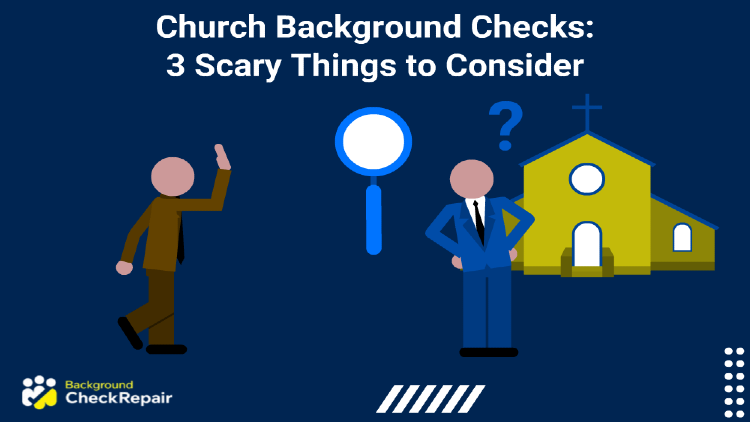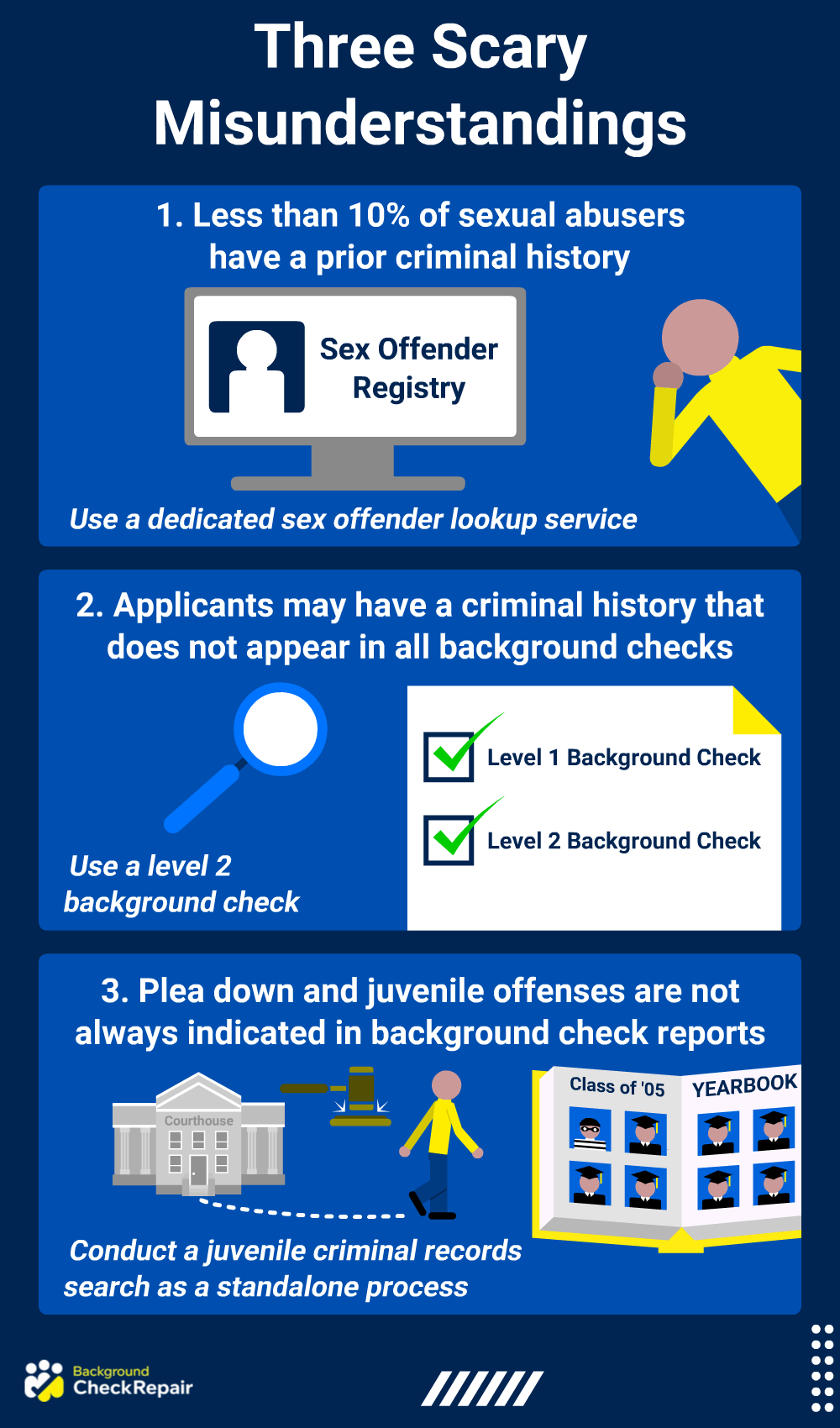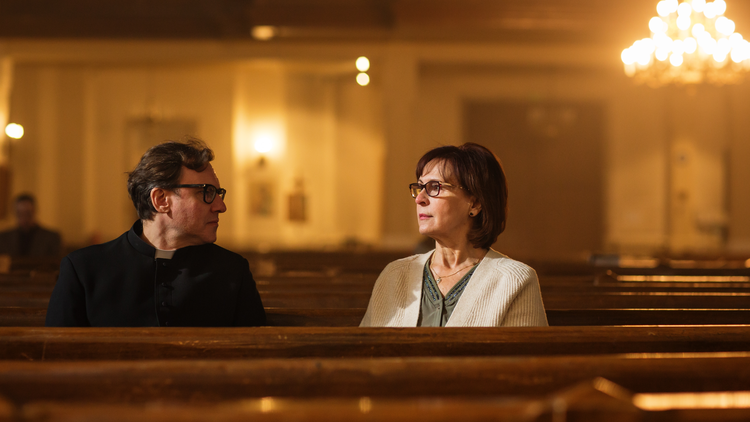We use cookies to ensure that we give you the best experience on our website. If you continue to use this site we will assume that you are happy with it
Church Background Checks: 3 Scary Screening Mistakes Churches Make
 Written by Background Check Repair
Written by Background Check Repair
Background Checks | May 13, 2024

Table of Contents
Recent scandals within the clergy and religious community have increased the need for church background checks. In fact, there are three universal screening mistakes that most pastors, church boards, and hiring committees make when allowing anyone into their ministry.
Sexual abuse occurs across all demographics, including the most educated professionals, the wealthiest families, and even ordained ministers. A criminal background check can help to remove and prevent abusers from gaining ministry positions before they have access to children or youth members in the church, but there is more.
Many people mistakenly believe that a simple background screening will safeguard church members from sexual abuse. But a criminal record check is just the beginning.
In reality, thorough screening, ongoing training, and education must go hand-in-hand with a comprehensive safety system. It is dangerous to assume that simply checking a box on an employee’s application is enough. That only addresses the easiest issue to deal with and is not an appropriate form of abuse and crime prevention.
However, with the right combination of prevention and preparation, you can avoid the dangers.
Screening Clergy Using Background Checks: Understanding Church Background Checks and Searches
There are three scary things many churches never consider when conducting screening on clergy as well as church volunteers. It is typically due to a lack of understanding of the methods and laws behind background screenings and a lack of knowledge on conducting a records check the right way for potential church officials and helpers alike.
These 3 scary misunderstandings are:

- Less than 10% of sexual abusers have a prior criminal history (why you must always use a dedicated sex offender lookup service, such as the Texas sex offenders registry for example).
- Due to state and US laws, ministry applicants may have a criminal history that does not appear in background checks (this makes it absolutely critical to use a level 2 records check and not a level 1 check).
- Plea down and juvenile offenses can be red flags that are not always indicated in background check reports (therefore a juvenile criminal history check must be conducted as a standalone process).1
When most people think about employment background screening, they think about looking for a criminal record. However, the reality is that most sexual abusers do not have a criminal record. In fact, according to a report by ABC News, more than 90% of child molesters in the US are never caught by law enforcement agencies or charged for their crimes.2
Because so many sexual abusers go undetected, it is never a good idea to assume that just because an applicant has a “clean record” this person will not pose a threat to members of your church community.
In addition, federal laws such as the US Fair Credit Reporting Act (FCRA) limit what information may be available when conducting a background check and the data employers can use to make hiring decisions.
When doing background checks for ministry positions, churches often look for evidence of criminal activity within the past seven years as per the FCRA reporting window. This time frame is considered the “legal” standard but does not necessarily mean that an applicant with a criminal history that exceeds 7 years is qualified to work with minors.
A criminal background check can never guarantee that an individual who has committed past crimes will continue to act in the same way in the future. However, it is essential to note that even when law enforcement authorities or courts are involved, these figures still do not represent the actual number of sexual abusers that exist. This is because, according to RAINN (Rape, Abuse, & Incest National Network), less than 30% of sexual assaults are actually reported to the police.3
In other cases, an organization may have an applicant with a conviction that is a result of a plea-down deal. In a plea deal, the defendant may have pleaded guilty to a charge that was different from the original offense. This means that an employer may not be able to find evidence of this type of conviction through background check screenings because it does not exist in any public record. This also applies to certain types of juvenile offenses.
An organization may find that an applicant who appears to have a clean record has actually had their record sealed or expunged. This can create a severe risk factor for employers and hiring managers who do not know about the applicant’s prior legal history.
Why You Should Conduct Background Checks on Ministry Leaders
The church background check process is not just about checking someone’s qualifications for employment. It is also important to screen management, those who volunteer with access to minors, and anyone else who will be in close proximity to other vulnerable groups in the church.
Church background checks can be used to complement policies, procedures, digital management software, and protocols for screening candidates who serve people under 18 years old or vulnerable adults. Reputable background check companies will offer many services, including identity verification as well as criminal and employment history. This type of report can provide insight into who an applicant is and whether they are the best fit for management within your organization.

Checks into churches and their volunteers ensure the safety of everyone within the church community and can provide peace of mind for parents. Screening ministry workers also protect the church’s reputation by guaranteeing that anyone in leadership is qualified and has a proven track record of good service.
Many churches may not feel comfortable asking potential employees about their past legal history out of respect for applicants’ privacy rights. Conducting checks background checks can help capture information without forcing an applicant to make personal disclosures on the spot. From a back bookshop volunteer to the head of a congregation, all church personnel should be screened. Always get a complete and accurate picture of an applicant’s background to make the best possible decision for your church.
When screening someone for a volunteer or paid position in your church, it is important to remember that just because volunteers do not have criminal records, it doesn’t mean that safety is not a concern. Many abusers do not have prior criminal records, so it is important to take other measures to ensure a volunteer is not dangerous. A criminal background check should never be the only tool used in the screening process. A menu of screening methods is available for organizations to create a complete, comprehensive system.
Church background checks can not only make an organization more responsible and accountable; they can also help the church maintain trust among its members and within the community as a whole. Ministry services are a vital part of any community. When those services are entrusted to the wrong people, it can have serious consequences. Protect your ministry and those who depend on it by implementing a comprehensive background check process.
What Background Information Is Available in a Background Check
Comprehensive background checks screen for a variety of information, including criminal records, driving records, education verification, and employment history.

When screening candidates for work with minors or vulnerable adults, it is important to review the type of information that is available in background checks overview. The following is a list of some of the most common items that are included in a comprehensive background check report:
- Identity Verification: Identity verification is the process of confirming the identity of an individual by checking their name, date of birth, and Social Security number.
- Criminal Records: A criminal record search will reveal any arrests, convictions, and outstanding warrants an individual may have. Agencies may use data from the FBI’s National Instant Criminal Background Search System (NICS) when conducting a criminal history search. If you are wondering about the extent of an FBI background investigation in terms of years, it will depend on the state where you reside and the depth of the background check.
- Driving Record: A driving record search will show a candidate’s driving history, including any accidents or citations they have received.
- Education Verification: Education verification will confirm the education information that an applicant has provided on their employment application.
- Employment History: An employment history search will confirm how long a candidate has worked at each place listed on their resume and will also show any gaps in employment.
Churches and volunteer management have a responsibility to be proactive about screening candidates who could present a risk to the people they serve. By using church background checks, ministries can gain valuable insight into the qualifications of their applicants as well as how they have acted in prior positions.
With comprehensive background checks, churches can be confident that the information that they get about an individual is accurate and up-to-date. Reliable US-based background check companies only include the most recent records available through public records and verify the accuracy of the data before reporting it to their clients.
Background checks, and background for churches must look beyond criminal history. A complete background check should include a search of sex offender registries in all states where the applicant has lived in the past 7 years. This will help identify any potential offenders and can help you make an informed decision about who to allow near your ministry.
Background Checks Overview: Reputable Background Check Providers and the Background Check Process
To protect your church community, it is essential to enlist the services of a trustworthy background screening agency as a part of your organization’s safety protocol. However, keep in mind that while using reputable background check providers will incur a fee, no-cost criminal history search sites are often unregulated and lack the proper security protocols needed to keep your church community safe.
An effective safety culture needs to include ongoing training and education for both staff members and volunteers who have access to children or youth in the community. This prevents new hires from trying to hide their criminal past through legal obfuscation and allows your team to be proactive in identifying potential dangers.
Like any organization, churches are vulnerable to abuse when proper safety measures are not in place. By utilizing comprehensive background checks, churches can create a safety system that helps protect their church members while also maintaining transparency and trust within the community.
Churches want staff members who are trustworthy. No one wants to hire someone who has the potential to harm others. When churches conduct background checks on their employees, applicants will go through a screening process where they complete an application and are vetted by industry professionals. This is why it is important to use a provider that offers thorough and accurate information. Church background checks can protect your organization from potential liability and it is advisable only to utilize trustworthy background check providers when conducting background checks.
References
1Church Executive. 20 March 2020. Criminal background checks — not a silver bullet! 30 November 2021. Web. <https://churchexecutive.com/archives/stop-sexual-abuse-4>
2ABC News. 7 January 2006. Myths About Sex Offenders. 30 November 2021. Web. <https://abcnews.go.com/US/story?id=90200&page=1>
3RAINN. 2021. The Criminal Justice System: Statistics. 30 November 2021. Web. <https://www.rainn.org/statistics/criminal-justice-system>
